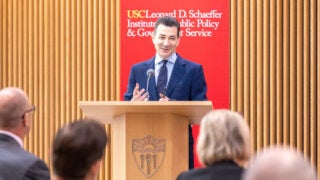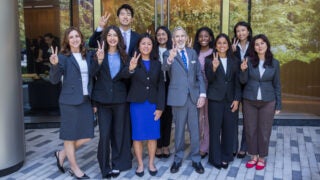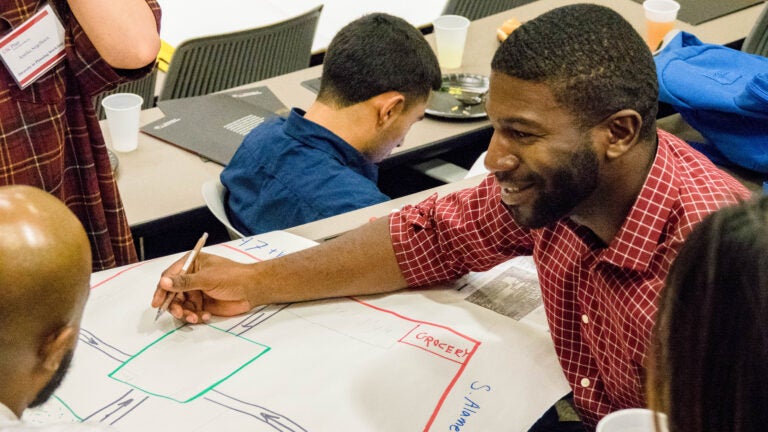
The workshop drew students from across the country. (USC Photo/Deirdre Flanagan)
How focus on diversity is helping urban planners build better communities
People with the right voices and backgrounds are needed more than ever in the planning profession, USC professor says
State and local governments are taking more ownership over how their own communities are being built, with diversity as a key element in the process.
And that’s a win for urban planners, as well as grassroots groups.
“Everywhere around, we’re having these really significant debates about how we construct cities, how we support the people who live in those cities and how we respond to the kinds of disparities that exist around parks, food and other resources,” said David Sloane, a professor at the USC Price School of Public Policy. “There’s a lot of planning to be done.”
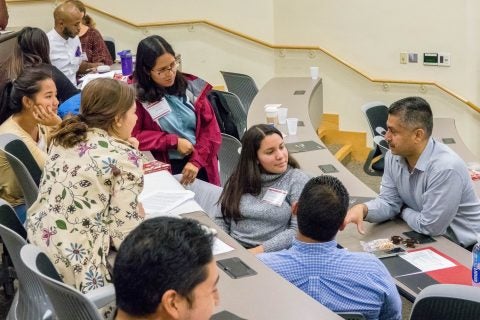
Sloane shared his thoughts at a Diversity in Planning Workshop attended by undergraduates and recent college graduates from across the country. The recent event was the latest in USC Price’s ongoing effort to increase diversity in Master of Planning degree programs.
“It’s become increasingly clear in the planning profession, just like every other profession in the United States and around the world, that we need to have people with the right voices, right backgrounds and right competencies so that they can represent neighborhoods or talk with neighbors about what’s happening to them,” Sloane said.
‘Revolutionary’ power of planning
Tamika Butler, executive director of the L.A. Neighborhood Land Trust, echoed that sentiment in her keynote address. She started her career as a lawyer but realized there is something revolutionary about going into planning.
“I think too often folks of color don’t think about this space because there’s a lot of pressure on us to be a lawyer or a doctor,” Butler said. “But they don’t realize the power of space and of who creates the space, who’s at the decision-making table deciding where the railroad tracks go.”
Adjunct Associate Professor Deepak Bahl led an activity on the Jordan Downs Redevelopment Project that mirrored the professional side of planning and development by giving the participants a taste of the challenges, tensions and issues of the professions.
“You are thrust into these real challenges — but conversely, it is an opportunity,” said Bahl, program director of USC Price’s Center for Economic Development. “We’ve got a prime site, but there has been a neglect. What do we do as planners? Do we just depend on the market or do we do some intervention? What are some of the policies or inducements we can put in place to change this cycle?”
The workshop attendees broke into groups that produced ideas such as creating sustainable jobs within the community, increasing housing and green space, adding a shuttle to the Blue Line Metro station, opening up the site to more street access and providing supportive services.
From peers to practitioners
Moderated by adjunct faculty member Cliff Graves, a panel of recent MPL alumni discussed their early career experiences in planning.
“One of the benefits at Price was the collaborative projects to deal with different dynamics, people, walks of life and perspectives,” Bejarano said. “You’re able to be the voice for where you come from. It allows you to find that voice here and nourish it so when you go into your career, you have more confidence and use that to be representative of your community.”
Idemudia encouraged the students to decide on a purpose before entering their career and to let that purpose be a guide.
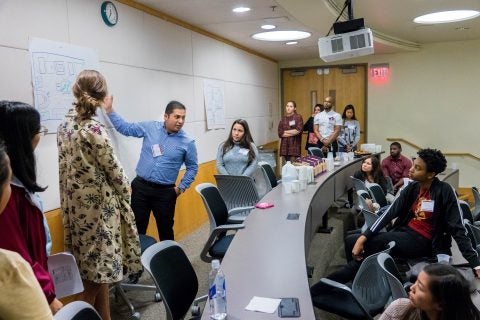
“No matter what job or task you’re doing, they should be tied to accomplishing that purpose,” Idemudia said. “That purpose for me is making sure people’s built environment is built in such a way that they have the same opportunities as people across town. From Brentwood to South L.A., there’s about an 11-year difference in life expectancy. That’s not acceptable. That’s what drives me.”
The alumni panel was a highlight for participants in the workshop, who also got to hear about the graduate school application process from Sarah Esquivel, associate director of USC Price’s recruitment and admissions office.
“The alumni gave good insight into what the professional experience is like and how the graduate school experience prepares you for that,” said Daniel Turner, a recent graduate from the University of Wisconsin-Madison. “I appreciated the diverse field of professional jobs the panelists worked in because I haven’t necessarily decided what I want to do yet. It’s reassuring to know there are many options.”

